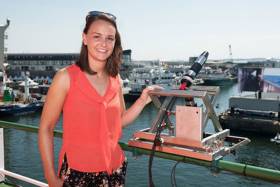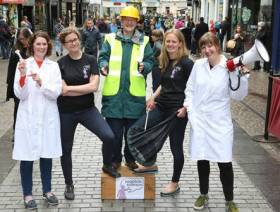Displaying items by tag: Soapbox Science
PhD student Catherine Jordan will bring her research on phytoplankton blooms to the third annual Soapbox Science even in Galway tomorrow afternoon (Saturday 29 June).
She will be among 12 female scientists standing on their soapboxes to talk about their groundbreaking research in the areas of science, technology, engineering, mathematics and medicine at the city’s Spanish Arch from noon to 3pm.
Jordan, a PhD candidate through the Marine Institute’s Cullen Fellowship Programme and NUI Galway, will discuss her research on using satellite technology to observe and identify phytoplankton blooms in North-East Atlantic waters.
“When conditions are right, phytoplankton appear in high numbers and produce green and dark red hues in the water and are known as ‘algal blooms’,” she explains.
“As these blooms can sometimes be visible from space, satellites provide a useful tool in monitoring the location and extent of these blooms.
“In most cases phytoplankton blooms are of benefit to the ecosystem, but a small proportion of phytoplankton species produce toxins which may affect other marine life.
“Satellites may be able to assist in providing early wide-scale warnings of the presence of algal blooms, by using ocean colour sensors. A lot of my research focuses on measuring optical properties of light by using different instruments and methods, as well as validating satellite measurements.”
Jordan recently joined the Marine Institute’s annual ocean climate research survey on the RV Celtic Explorer to collect plankton samples and hyperspectral radiometer data as part of her PhD research.
Speaking about the Soapbox Science even, Jordan said: “I am very passionate about my field of science and also promoting how women can work on marine research vessels and spend weeks at sea.
“It is very important to engage the public in learning about marine science in interactive ways in order to explain very complex matters. Soapbox Science is an excellent platform for promoting women in science and encouraging the public to discuss topics they may not have encountered before.”
Soapbox Science Galway began two years ago, and talks this year will cover a diverse range of topics such as enhancing farming using insects, the marvels of human milk, the internet as a force for good, and statistical thinking for real-life questions.
The event will also be held in Dublin and Cork, as well as in several countries around the world including the UK, US, Canada, Australia, Sweden, Germany, Brazil and South Africa.
For the full list of participants and more information about Soapbox Science visit soapboxscience.org
#MarineScience - A postdoctoral researcher with the Marine Institute will join a group of female scientists as they take take to their soapboxes and bring science to the streets of Galway tomorrow lunchtime.
Soapbox Science takes place from 11am to 2pm at the Spanish Arch on Saturday 15 July, with participants sharing with the public their passion for all things science.
This is the first time that Soapbox Science, founded in the UK seven years ago, has come to Galway, with the initiative also set to reach Belfast in 2017.
The event has two aims: to bring science to unexpected locations to give a broader sector of society the opportunity to meet and interact with scientists, and to promote the visibility of women in science.
This year’s talks will cover diverse subjects such as how to make stars, building your own body parts and sustainable fisheries.
Representing the Marine Institute is Dr Debbi Pedreschi, a marine scientist working on finding ways to implement the ecosystems approach to fisheries management.
Speaking ahead of her talk, Dr Pedreschi said: “I appreciate all events that promote science, and women in science, but that most importantly, engage the public.
“Soapbox Science literally ‘takes it to the streets’ and I think that is an amazing initiative and opportunity. It removes all barriers allowing curiosity to peak and conversations to flow.”
Dr Jessamyn Fairfield, Soapbox Science organiser and a physicist at NUI Galway, added: “When many people think of a scientist, they think of a man in a white coat. Soapbox Science aims to challenge this perception by showcasing the work of female scientists in a fun and friendly way.
“In order to keep up with the need for a skilled STEM workforce, the scientific community must continue to attract the best talent, and be open and inclusive. We hope that this event can inspire people to look at science in a different way.”
Soapbox Science speakers and their topics include:
- Prof Laoise McNamara, NUI Galway: Close to the bone: Engineering research into the biology of osteoporosis and implants.
- Dr Rachel Cave, NUI Galway: Help, help, I think my house is dissolving! How ocean acidification works and why it matters.
- Dr Rachel Quinlan, NUI Galway: How to make stars (in two and three dimensions).
- Dr Marie Coggins, NUI Galway: Are you breathing clean air indoors?
- Dr Sharon Glynn, NUI Galway: A new dimension to ancient enemies: What are these hidden viruses in our DNA and how do they contribute to cancer development?
- Dr Heather Teresa Lally, GMIT: How do creepy crawlies adapt to living in a watery underworld?
- Dr Debbi Pedreschi, Marine Institute: The story of sustainable fisheries: solving ‘wicked problems’ and other tales.
- Juhi Samal, NUI Galway: Biomaterial pills for Parkinson’s: saving cells to stop shaking?
- Kirsten Fossum, NUI Galway: Clouds: where do they come from, where do they go?
- Adele Gabba, NUI Galway: The sweet universe of carbohydrates chemistry!
- Fiona Malone, GMIT: Biomedical engineering: build your own body parts.
- Dr Caroline Sullivan, IT Sligo: The Wild Atlantic Way: why it’s so beautiful and how farmers helped create it.
Over 350 women have taken part in Soapbox Science since 2011, with a further 220 participating in the 19 events taking place during 2017.
Over 55,000 people attended Soapbox Science events in 2016, with 85 per cent rating them as enjoyable or extremely enjoyable, and over a third stating it had an effect on their awareness of women in science.
The event is free and open to the public. For more information about Soapbox Science visit soapboxscience.org.






























































